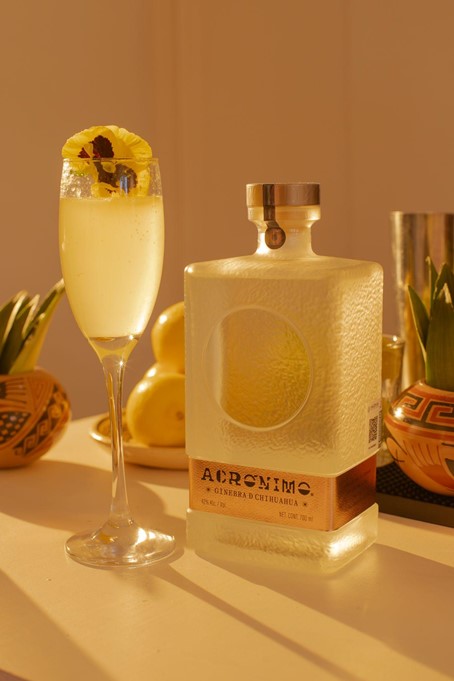Craft Gin vs Commercial Gin: What’s the Real Difference?

Globally, gin aficionados are aware that not every gin is produced equally. Whether you’re making a custom cocktail or enjoying a traditional gin and tonic, you have most likely observed changes in flavor, quality, and general experience.
Still, have you ever considered what craft gin is vs. commercial gin? We will examine in great detail in this essay the variations between commercial and craft gin, their manufacturing techniques, components, and much more.
You will be more aware of what makes every kind so special at the end.
Table of Contents
What is Craft Gin?
Craft gin is really about creativity and excellence. Usually small quantities of these gins are made by private distilleries emphasizing premium ingredients and distinctive flavor profiles.
Experimenting with various botanicals, craft distillers take great delight in creating a gin frequently more complex and flavorful than mass-produced commercial gin.
Small-scale production—where the distiller controls every stage of the process—is the trademark of craft gin.
This can involve paying close attention to every aspect, allowing for more cautious flavor extraction by using conventional copper pot stills, and using them.
Craft gin thus usually has a unique character that reflects the inventiveness and enthusiasm of its creators.
Craft Gin Ingredients and Flavour Profiles
Generally speaking, craft gins are created from a greater range of botanicals than their commercial equivalents.
Although juniper berries are still the major component, distillers could include exotic spices and flowers or citrus peel.
This provides every artisan gin a different taste sensation, very different from one brand to another.
Some distilleries even go so far as to obtain their ingredients locally, therefore guaranteeing a regional or seasonal flavor to their gin.
For example, you might discover a homemade gin created from local fruits gathered during the harvest season or wildflowers from the surroundings.
One of the reasons artisanal gin tastes so distinct from commercial versions is this focus on precision in choosing and mixing botanicals.
What is Commercial Gin?
Conversely, commercial gin is usually mass-produced by big companies and usually gives consistency and cost-effectiveness top priority over original flavors.
Focusing on creating a gin that is widely identifiable and accessible everywhere, these firms want to create a product appealing to the largest audience feasible.
Usually produced in bigger batches and utilizing more consistent manufacturing techniques, commercial gins. Juniper is still the main botanical, taste profiles usually are simpler, and there are fewer variances.
Although they nevertheless retain quality, the manufacturing method is more focused on efficiency, and the degree of workmanship displayed there is not always the same as found in craft gins.
Commercial Gin Ingredients and Flavour Profiles
Commercial gin sometimes depends on fewer botanicals than handmade gin. Their appeal to a larger audience stems from the fact that the flavors often seem to be more balanced but less sophisticated.
Usually distilled many times to attain a smooth, clean taste, many commercial gin products start with a neutral grain spirit. This lets the gin acquire the qualities of the botanicals, but it lacks the depth and richness you see in smaller-batch craft gins.
Key differences between Commercial and Craft Gin
To really understand the difference between craft gin vs commercial gin, let’s have a look at some differences. Having discussed what each kind of gin is, let’s now more closely examine the main variations between them.
1 Method of Production
Often using ancient techniques like copper pot stills, craft gin is created in small quantities with great attention to detail. This lends it a more artisanal quality; commercial gin is usually made using bigger, more efficient techniques meant to keep prices down and output strong.
2. Complexity of flavour
Thanks to the careful choice of botanicals and lower manufacturing scale, craft gin often has a more complicated and varied flavor profile. On the other hand, commercial gin usually has a simpler, more uniform taste meant to be constant over big quantities.
3. Ingredients
While many distilleries play with local or seasonal ingredients, Craft Gin employs a larger spectrum of botanicals. Commercial gin sticks to the basics—juniper, coriander, and citrus—using a more limited assortment.
4. Price
It is usually more costly than commercial gin because of the smaller-scale manufacturing and better-quality ingredients. Still, the price is usually justified by the unusual tastes and the skillfulness underlying every bottle.

Which One Should You Go With?
Whether one prefers commercial or craft gin truly comes down to taste. Craft gin can be your best choice if you want a more complex, adventurous gin with unusual tastes.
It’s ideal for people who like something created with thoughtfulness and attention and wish to discover new tastes. The choice between craft gin vs commercial gin is really up to the taster.
Conversely, commercial gin could be your best option if you want a classic gin that is reasonably priced and readily available.
For regular cocktails, this is a dependable selection with a more neutral taste profile that blends nicely with many mixers.
FAQs
- Is commercial gin necessarily inferior to craft gin?
Your taste will determine this. Although commercial gin can be more consistent and reasonably priced, craft gin provides special tastes and handcrafted manufacture.
- Can you mix cocktails with craft gin?
Indeed! Gin is great for drinks. Your gin-based beverages will have a distinctive touch from the unusual flavors.
- How is commercial gin created differently than craft gin?
Made in smaller quantities employing a larger spectrum of botanicals and traditional techniques, craft gin is different from mass-produced commercial gin, which runs on consistent ingredients and techniques.
- Does craft gin cost more than commercial gin?
Indeed, handmade gin’s small-batch manufacturing and better-quality ingredients make it typically more costly.
- Can you combine tonic water with handmade gin?
Indeed, craft gin goes really nicely with tonic water. Its multifarious tastes might enhance the basic gin and tonic experience.
Conclusion
The answer to craft gin vs commercial gin, which is better, lies in the eyes of the beholder. The choice in the struggle of craft gin vs commercial gin comes mostly from your desired gin.
Craft gin is perhaps the superior option if you appreciate imagination, taste complexity, and workmanship. Commercial gin will, however, fit your needs rather nicely if you’re looking for a dependable, reasonably priced solution for regular cocktails.
Either way, both kinds of gin have a place in the realm of spirits; there is no right or wrong decision, only what suits you!
